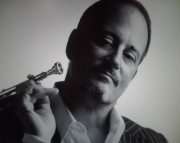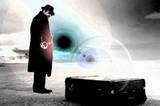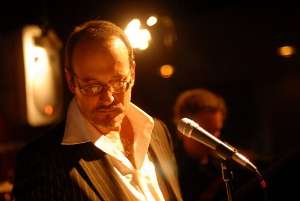Interview with Jeff Oster–a trumpet player (trumpeter)
About Jeff Oster:

Jeff’s story has been a long, surprising, meandering one, with a second (or third, or fourth) act that once wouldn’t have seemed possible. Nearly 30 years ago, Jeff first decided to play music for a living; 20 years ago, he set aside his musical ambitions and moved on to a more lucrative day job; and about five years ago, he finally found that his day job made it possible for him to revive those initial dreams. Jeff is now releasing his second album, “True,” an artful blend of ambient grooves with his warm, jazz-inflected trumpet and flugelhorn playing. The album is the next step in a unique trip that has turned a one-time limo driver, standup comic, bar-band musician and financial planner into an unexpected force in the world of instrumental music.
Produced by Will Ackerman, the founder of Windham Hill Records, “True” features music composed and performed by Oster, Ackerman, Jan Pulsford, Patrick Gorman and Ugandan vocalist Samite. The album was mixed by Bryan Carrigan (Alanis Morrissette, No Doubt) and the legendary engineer Bruce Swedien, whose other work includes Michael Jackson’s “Thriller.”
“There have been a million recordings of horn players, some of them utterly brilliant, but in all these recordings there has never been anyone who incorporates so many influences or blurs genres or traditions as gracefully as Jeff Oster does,” says Ackerman. “The elements are familiar, but the synthesis is unique.
This is a milestone recording.”
 For Jeff, though, the synthesis simply comes naturally. “The second record has more rhythm than the first, but none of it is really planned,” he says. “I just play what moves me, what I love, what sounds good to me. And I start by hunting for sound, more than anything else. I look for what’s out there that I can react to, build the songs from there, and figure, if I love it, maybe somebody else is going to love it.”
For Jeff, though, the synthesis simply comes naturally. “The second record has more rhythm than the first, but none of it is really planned,” he says. “I just play what moves me, what I love, what sounds good to me. And I start by hunting for sound, more than anything else. I look for what’s out there that I can react to, build the songs from there, and figure, if I love it, maybe somebody else is going to love it.”
Raised in Florida, Jeff began playing music at the age of eight. He moved to Oregon for college, made contacts in the record industry, and came to Los Angeles to visit; a six-hour audition to become Ray Charles’ trumpet player didn’t result in the gig, but it was exciting enough that he moved to L.A. to try to break into the business.
When a record deal didn’t materialize immediately, he worked as a limo driver, often playing his song demos for the captive audience in his car. (One passenger, country singer Mel Tillis, was encouraging enough to help him get into ASCAP.) He wrote songs, played in cover bands in L.A., Las Vegas and Lake Tahoe, worked the wedding circuit, and even tried his hand at standup comedy for a while. In 1987, though, a client convinced him that he’d make a good stockbroker and financial planner; the client was right, and for the last 20 years Jeff has been extremely successful in the financial industry.
Jeff’s musical dreams resurfaced strongly in 2003, when he began using the computer software program Sonic Acid to create music using downloaded drum, bass and synthesizer tracks. Although he’d record his horn parts from across the room using the computer’s tiny built-in voice microphone, the resulting songs sounded good enough to become favorites on the mp3.com service, where he placed four songs on the Top Ten Downloads list. “I’d recorded these songs at three in the morning on a little 38-cent microphone,” he says, “but I was getting 40,000 downloads a month, so I knew I had something going on.”
 The songs also attracted Will Ackerman, a musical idol of Jeff’s since the late 1970s. The two men recorded together in late 2003, cutting tracks that became the “At Last” EP and then the full-length album “Released.” The album, which Jeff has described as “Chet Baker meets Dead Can Dance,” won the 2005 Album of the Year and Best Contemporary Instrumental Album awards at the NAR Lifestyle Music Awards, which are voted by broadcasters and handed out by the New Age Reporter, the leading journal to cover New Age, World, Ambient and Electronic music. The Oster/Ackerman composition “At Last” also won the Best New Age Song award at the 2005 Independent Music Awards.
The songs also attracted Will Ackerman, a musical idol of Jeff’s since the late 1970s. The two men recorded together in late 2003, cutting tracks that became the “At Last” EP and then the full-length album “Released.” The album, which Jeff has described as “Chet Baker meets Dead Can Dance,” won the 2005 Album of the Year and Best Contemporary Instrumental Album awards at the NAR Lifestyle Music Awards, which are voted by broadcasters and handed out by the New Age Reporter, the leading journal to cover New Age, World, Ambient and Electronic music. The Oster/Ackerman composition “At Last” also won the Best New Age Song award at the 2005 Independent Music Awards.
“True” features many of the same contributors as “Released,” with more emphasis on the rhythm tracks and on sounds from around the world, including Tibetan throat chants on “Tibet” and a spoken/sung interlude from Samite on “Serengeti.” Musicians include drummer Keith Carlock, bassists T-Bone Wolk and Michael Manring, cellist Eugene Friesen, keyboardists Philip Aaberg and Jan Pulsford, guitarists Patrick Gorman and Ackerman, percussionist Derrik Jordan, and vocalists Noah Wilding and Melissa R. Kaplan. “It might sound like hyperbole, but we may be witnessing the emergence of the next instrumental superstar,” wrote Bill Binkelman in an advance review in the New Age Reporter.
For Jeff Oster, though, superstardom was never the point. His goal, he came to realize after the years of driving limos and playing in bar bands and working as a financial advisor, is simply to play what he wants, to find music he loves and pass it on to anybody who wants to listen.
“Over the years, I never had any idea of what kind of music I would make on my own,” he says. “At first I was either trying to play other people’s music, or I was trying to write music that other people would record. And I never really thought about what my music would be like. I never said, ‘I’m gonna be an ambient chilled jazz flugelhorn player.’ But because I have enough financial resources now, I’m not trying to sound like whatever’s selling now. I‘m just going for stuff that sounds good and makes me feel good. And that’s an incredibly freeing way to work.”
We had an email interview with Jeff.
Q1. Talking about music, what was the main point that attracted you to it?
Music has been a part of my life as long as I can remember. My father was a singer in musical theater, and there was always classical music playing in our home.
When I began to study the trumpet at the age of 8, I began to listen to artists like Herb Alpert, Louis Armstrong and Miles Davis. Once I became a performer of music on the trumpet, my love for it only increased. It is a place of joy and peace for me, and I can’t imagine my world without it.
Q2. Tell us how you picked up the jazz-inflected trumpet as your instrument?
When I was 8 years old, our third grade class was offered a choice of musical instruments to play. My parents told me that I came home and said that I chose the trumpet because “I wanted to play the melody”.
From then on I took lessons, mostly in classical music. Once I learned the basics of tone and technique, I began to play more contemporary music.
I spent many hours playing jazz standards from the 30s and 40s while my father sang along. I’m sure the neighbors got tired of hearing Hello Dolly over and over again, but it sure paid off!
I think that my playing today is influenced by these hours of playing songs made popular by singers…I hear the lyrics and vocal phrasing as I play my horn.
At age 20 I bought a flugelhorn, which is a warmer and darker sounding instrument. I prefer this to my trumpet, and most of my recordings have been on the flugelhorn.
Q3. How personally satisfying has been the journey so far? Do you feel you could have done better in any other profession?
It’s been a very interesting journey, I must say! I have worked in multiple professions throughout my life, all in an effort to support my music.
I have spent many years in financial planning and have some success in that field as well, but my first love has been and will always be my music.
One of the best parts about making music, is that you can ALWAYS do “better” — play a sweeter note, write a more complete song, find the perfect melody. The unending quest for perfection is the beauty of the path itself.
Q4. How you like the element of experiment, creativity and innovation in music?
In life and in music, the only way to grow is to try new things. I find that playing live is the best place to experience new ways of making music.
The ability to share ideas with other artists in a live setting leads me to places in music, and with my instrument, that I might never have gone to alone.
I think the challenge is to break new ground, to say things I haven’t said musically yet. It is one of the supreme challenges and joys of making music.
Q5. While working with other musicians, how you feel it increases your own repertoire and understanding of music?
Every artist has their own voice in their playing, and to be able to join them in conversation can stretch my own abilities. I have had the opportunity to share the stage with musicians from all over the world. I might not have been able to speak their language in words, but we communicated just fine with our music.
Q6. Which other instrument do you like and love to listen to?
I love many instruments:
I love the sound of the harpsichord, and the dulcimer.
The sound of Gamelan is very soothing to me, and the sitar transports me to another space and time.
The sound of a human voice, whether it is a male tenor in opera or Tibetan chant, to the raspy blues or gospel female voice, is unique and amazingly moving.
Recently I have been playing with some Native American flute artists, and that music is also very wonderful.
Q7. As per your own understanding, how music helps in maintaining the composure of human personality?
Music touches the inner truth in every human being. It is the aural representation of the God in all of us. It is why it calms a crying baby, and it is why it makes a hardened man weep.
It touches the essence of what is true inside every one of us – harmony, melody, and rhythm, individually and together, remind us of the source of all that is.
Q8. Have you tried fusion music? Given a chance, whom you would like to play with?
I am working on a new album now. It is very chilled and downtempo, trip hop sort of music. I suppose it could be considered fusion, perhaps FutureFusion!
I would love an opportunity to make music with many artists–Chris Botti, Anoushka Shankar, Mindi Abair come to mind, as well as Moby, Will Ackerman and Miles Davis if he was with us today.
I am about to record with Shambhu in the next few weeks, on a record he is working on produced by Will Ackerman. I am very much looking forward to being a part of his music as well.
Q9. Any personal memorable moment you would like to share with readers?
There are many, and I am fortunate:
The first time I heard my music on the radio (John Diliberto’s Echoes program) was amazing.
The drive home late at night listening to a song that Will Ackerman and I recorded together, crying tears of joy at a dream come true.
Sitting three feet from Ray Charles as he sat at his piano and rehearsed with his singers.
Mixing music from my CD TRUE with Bruce Swedien on the same board he used to record Michael Jackson’s THRILLER.
And, I truly believe that the MOST memorable moment is yet to come. I am READY!
Q10. What would be your advice to young musicians?
Write about what you know about. Don’t try to play like someone else–play like YOU. THAT is what resonates with us. Your heart, your soul is communicated through your instrument.
Don’t depend on the opinion of others…does it sound beautiful to YOU?
Do YOU like the way the song sounds, or the way your melody or harmony flows??? THAT’S all that matters.
If YOU love it, so will we.
And to quote Charlie Parker = “First, master your instrument, then forget all that sh@t and PLAY!”
Music is love.

3 thoughts on “Interview with Jeff Oster–a trumpet player (trumpeter)”